Blog
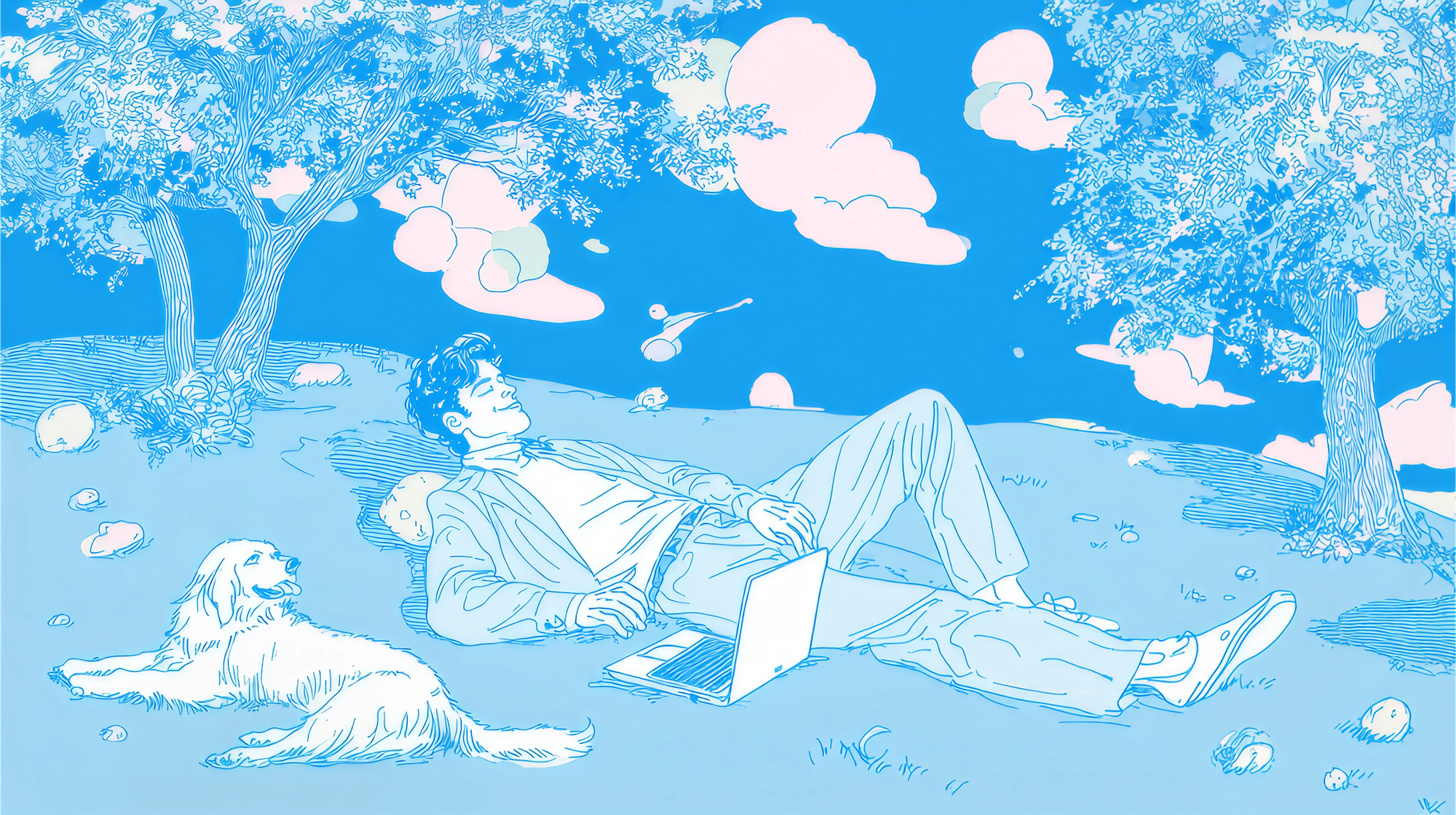
There's a common fear in the market: AI will make everything robotic, impersonal, and cold. Brands will become soulless content factories.
The reality is the opposite. When implemented correctly, AI doesn't make marketing less human. It frees professionals from mechanical work that was never truly creative.
Think about the day-to-day: resizing images for different platforms, reformatting content for various channels, compiling reports, managing workflows, scheduling posts, updating spreadsheets, organizing files, coordinating between tools. This isn't marketing. It's administrative work. And it consumes 60 to 70% of the average professional's time.
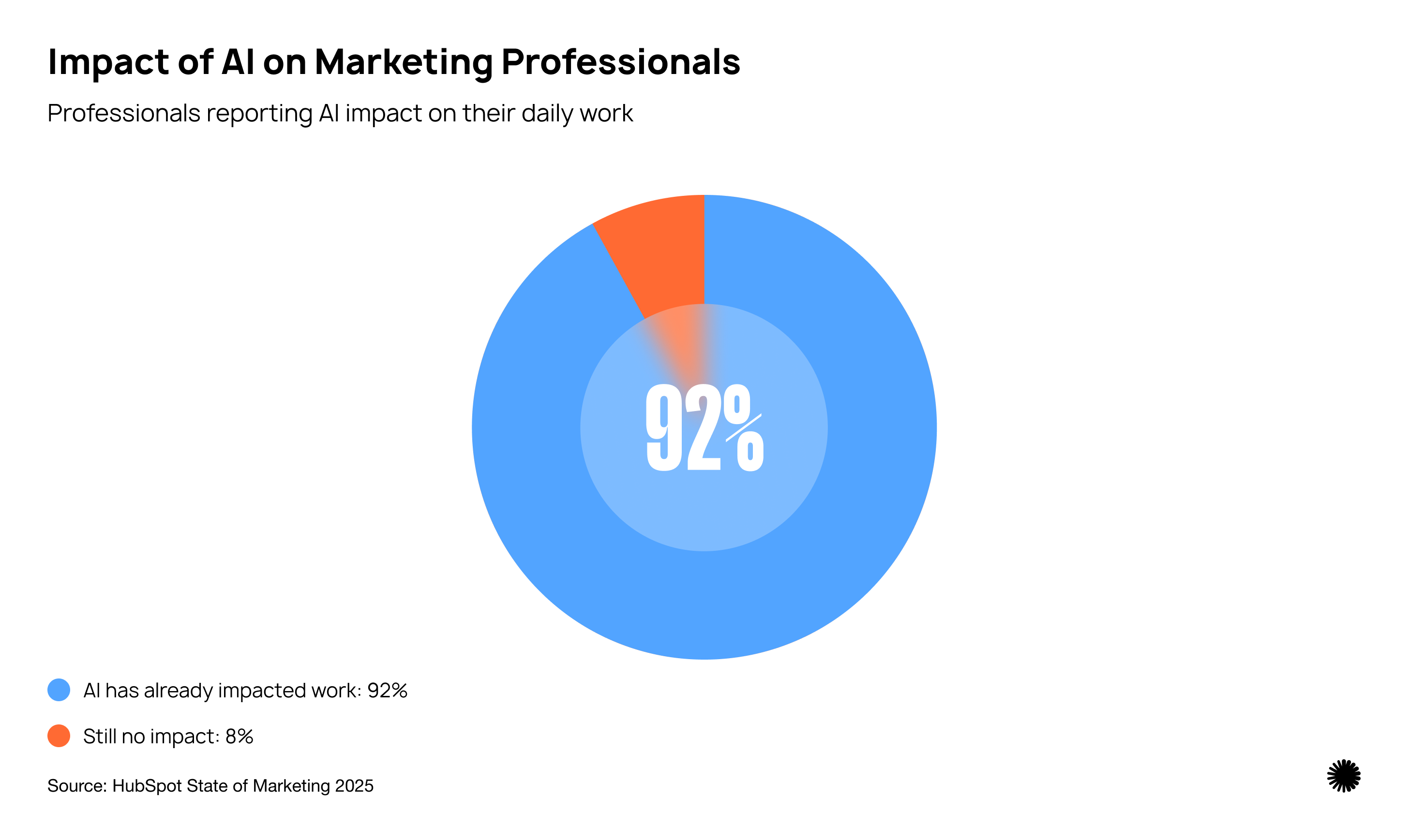
92% of marketing professionals report that AI has already impacted their roles. The impact isn't in replacing creativity. It's in reclaiming time for real creative and strategic work.
AI excels at processing large volumes of data instantly, identifying patterns in millions of data points, executing repetitive tasks with perfect consistency, optimizing based on clear metrics, and generating variations at infinite scale.
Humans, on the other hand, excel at understanding emotional context, making intuitive creative leaps, empathizing with customer experiences, recognizing cultural moments, creating stories that resonate on a human level, and building genuine relationships.
The companies' mistake? Trying to force humans to do AI work (data analysis, repetitive optimization) and AI to do human work (authentic creativity, strategic thinking). The solution is to let each do what they do best.
When AI handles data analysis, automation, and repetitive optimization (the "science" of marketing), professionals can focus on the "art."
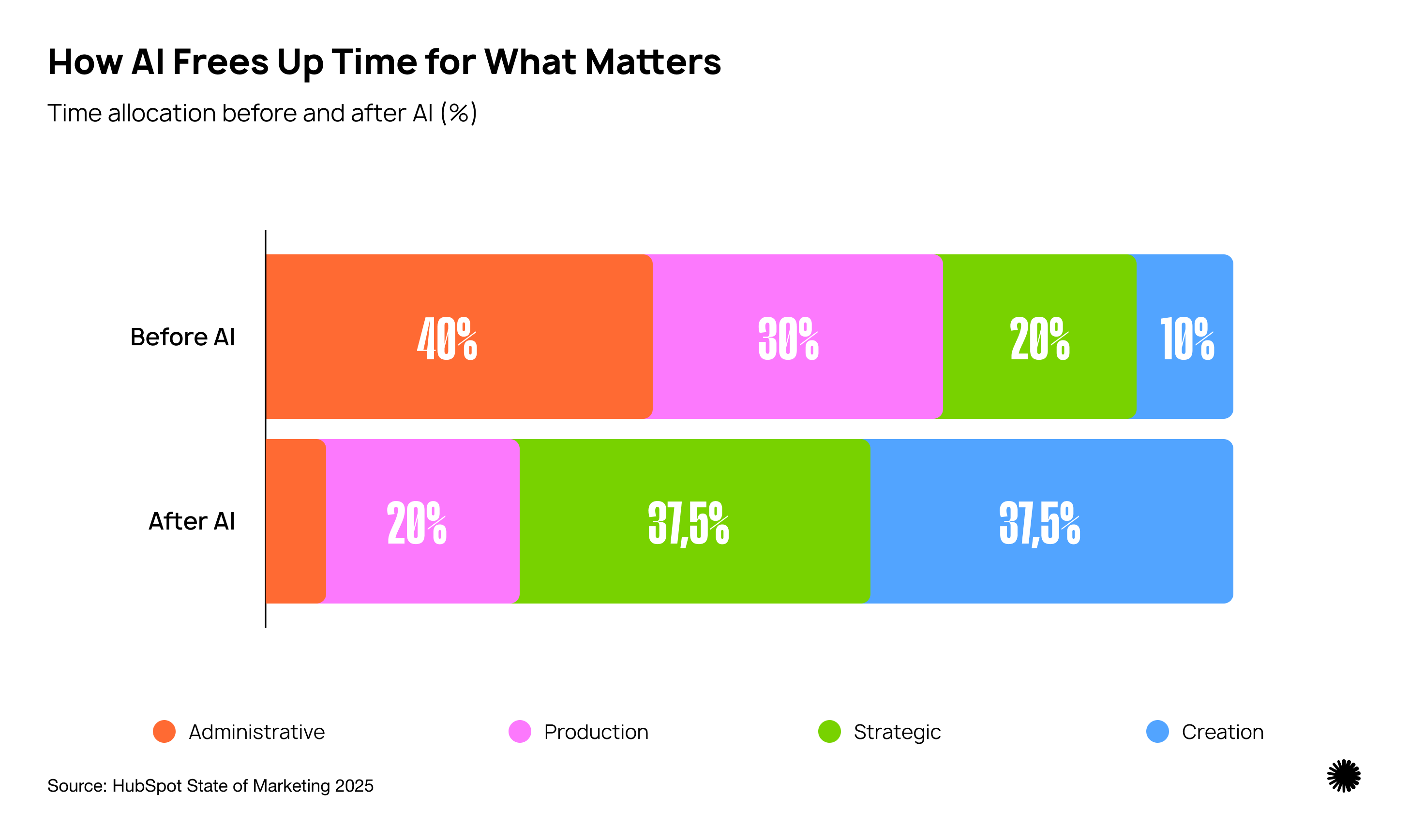
Before AI, a professional spent 40 hours manually creating 20 social media posts. With AI, they spend 4 hours defining the strategic narrative arc, 2 hours identifying key moments and themes, 2 hours reviewing AI-generated posts, and free up 32 hours for campaign strategy and creative conceptualization. The result is better campaigns, more thoughtful strategy, and stronger brand narrative.
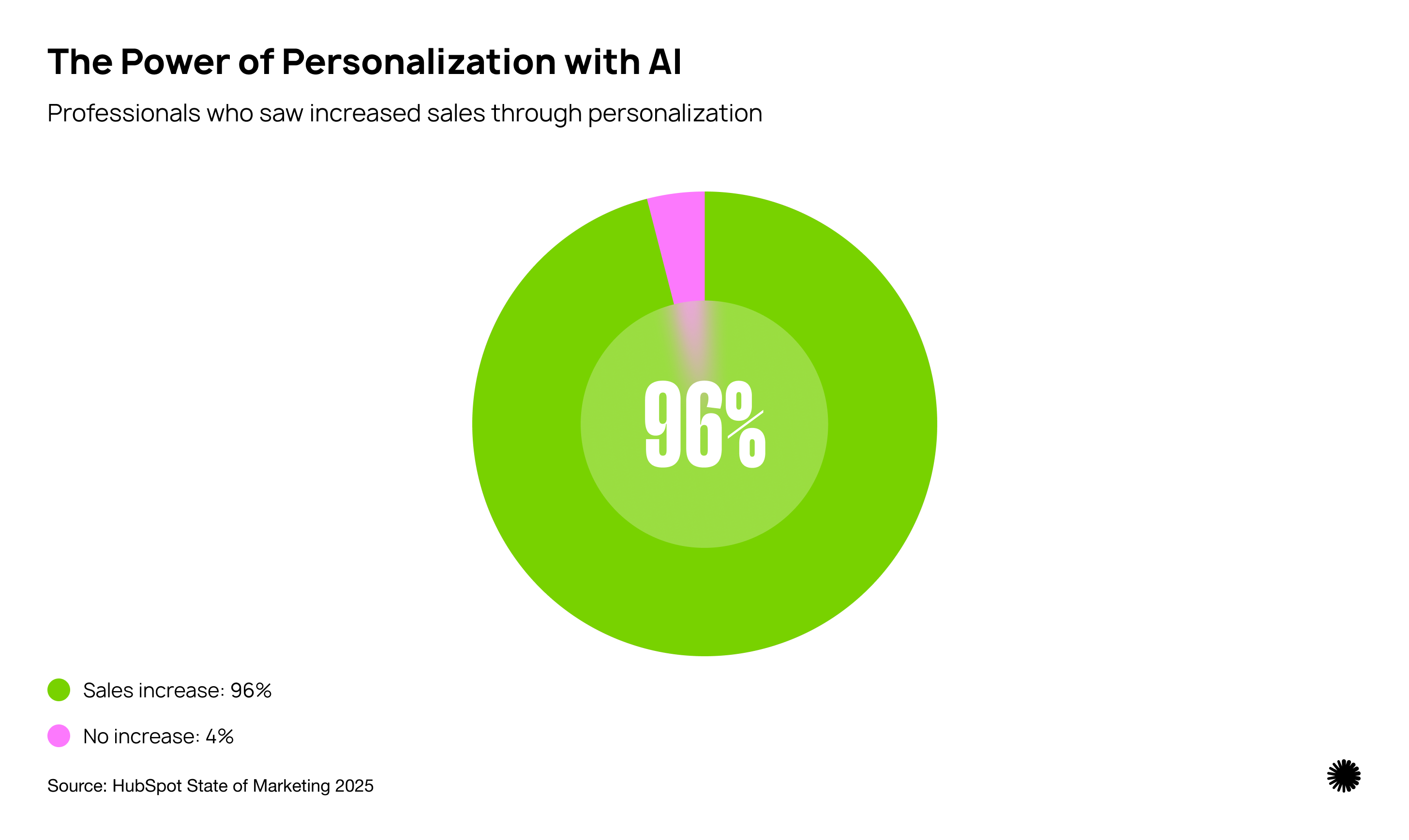
96% of professionals see sales increases with personalized experiences. But here's the insight: AI-powered personalization makes marketing MORE personal, not less.
The old way worked with broad segmentation, dividing the audience into 5 to 10 groups and creating generic messages for each segment. The AI way enables true personalization, where AI handles individual content adaptation while humans create the authentic strategic message.
Practical example: The professional creates the authentic message about decision difficulty, considering risk, ROI, and team capacity. AI automatically personalizes timing based on behavior, relevant examples for the specific sector, format according to preferences, and context of the journey stage. The result is a genuinely personal message at scale.
When professionals aren't drowning in production, they can truly innovate. As Kieran Flanagan, SVP of Marketing at HubSpot, says: "Marketing is going to change. Instead of scaling traffic, we need to scale attention. Much of marketing science will be automated by AI, leaving more time for the craft."
This means being able to test 10 creative approaches instead of debating which one to execute, having time to carefully evolve brand expression, doing deep research instead of superficial personas, and responding to cultural moments in real-time.
The most effective teams create genuine partnerships where each amplifies the other's strengths. Humans provide strategic direction, creative vision, emotional intelligence, cultural context, and ethical judgment. AI provides execution scale, pattern recognition, consistency maintenance, performance optimization, and workflow automation.
Together they create authentic and optimized campaigns, content that scales without losing quality, genuine (not algorithmic) personalization, data-informed creative work, and consistent yet fresh brand expression.
A B2B SaaS company with 8 professionals went from spending 70% of time on production and coordination to 75% on strategy and creativity. They jumped from 100 to 400 pieces of content per month, reduced campaign development from 6 weeks to 10 days, multiplied conversion rates by 2.5, and tripled deployment speed. The team's feedback? "Most creative work in years."
A consumer brand reduced from 12 to 10 professionals, reorganized into 3 cross-functional pods using a unified platform, completely eliminated the 20 weekly hours spent on manual reports, and saw 67% increase in engagement and 4x increase in user-generated content. The feedback: "Finally building brand, not just creating content."
The difference between success cases? They implemented AI infrastructure, not just tools.
AI tools like ChatGPT for text and Midjourney for images offer productivity gains of 20% and 15% respectively, but require humans to do all the integration, resulting in modest time savings of at most 25%. The result is doing the same things faster.
AI infrastructure with unified platform, connected flows from creation to distribution, automatic learning and optimization, and minimal integration generates dramatic time savings of 50 to 70%. The result is a fundamentally different type of work.
That's why platform choice matters so much. The wrong choice gives slightly faster content creation. The right choice gives 20 extra hours per week per professional to focus on strategic and creative work.
Human + AI Partnership: Our design team configures your entire brand system in personalized onboarding. We continuously refine settings based on performance data. We offer support in Portuguese/Spanish with real humans who understand your market and culture, unlike self-service-only platforms.
Brand Intelligence Engine: We pre-configure your brand's complete DNA (photographic style, color palette, tone of voice, personas) so you simply describe what you want in natural language, without prompt engineering. The platform learns unique patterns of what works for YOUR audience, not generic practices, unlike generic AI tools.
Unified Platform: We offer a single source of truth from brand guidelines to campaign deployment. The flow is integrated (create images, write copy, build campaigns, distribute, analyze) without juggling between 5 to 7 different tools, unlike fragmented solutions.
Performance Learning Cycle: We track every asset to know which visuals generate conversions for your brand. The platform gets smarter with each use through continuous improvement. We offer predictive recommendations like "This visual style converts 3x better for your audience," unlike static tools.
We don't just generate content. We amplify your brand's unique voice at scale.
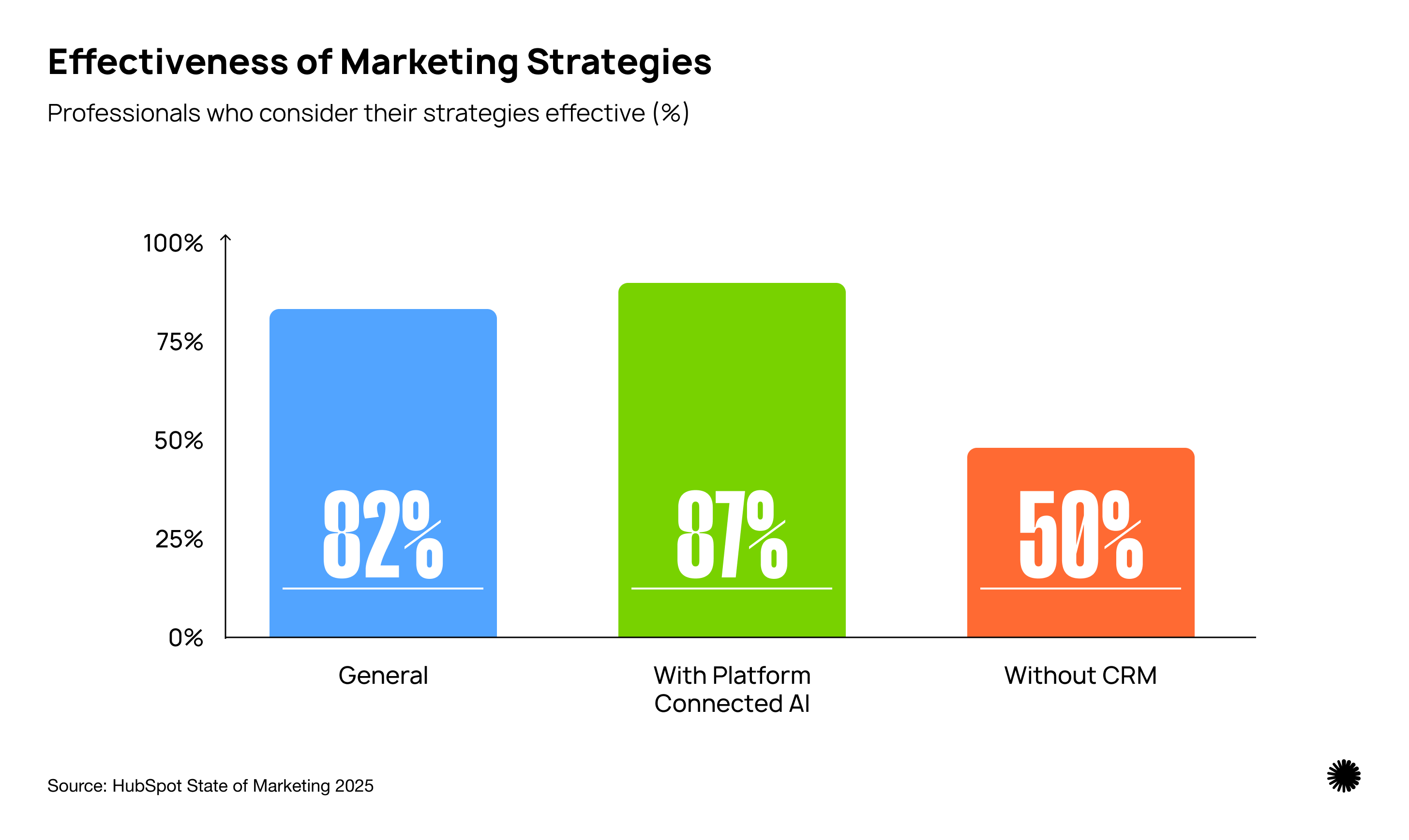
87% of professionals using AI-connected platforms report effective strategies because they have time to be strategic. They're not stuck in production cycles or drowning in coordination work. They're doing real marketing.
The future of marketing isn't human OR AI, but human AND AI in genuine partnership. AI handles the science while humans focus on the art. AI provides scale while humans give strategic direction. AI ensures consistency while humans drive creative innovation. AI optimizes execution while humans create meaningful connection.
When AI frees professionals from mechanical work, they can finally do what marketing always should have been: the creative and strategic discipline that builds brands and creates lasting relationships with customers.
The question for CMOs: are you using AI to make professionals more productive at administrative work? Or are you using AI to free them to be more human?
The teams seeing 87% effectiveness, 96% sales increases, and reclaiming 50 to 70% of time chose the second path. And their professionals, finally free from spreadsheets and resizing, are more creative, more strategic, and more effective than ever.
92% of professionals report that AI has already impacted their roles, primarily by reclaiming time from mechanical work. AI infrastructure reclaims 50 to 70% of professionals' time for strategic and creative work. 96% see sales increases with AI-powered personalization that feels MORE human. The future of marketing will be 0% administrative, 50% strategic, and 50% creative. The most human skills (empathy, storytelling, strategy) become more valuable. Platform choice determines whether AI makes work faster or fundamentally different.
HubSpot (2024). State of Marketing 2025.
Flanagan, K. (2024). The New AI-Powered CMO Playbook.
Bodnar, K. (2024). Foreword to State of Marketing 2025.
<
>